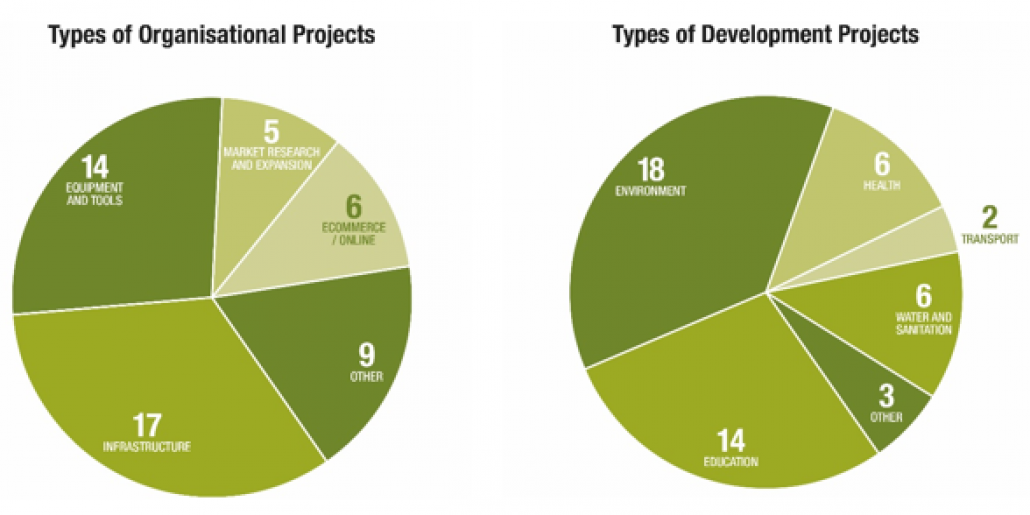Improvement in the livelihood of people as they trade their way out of poverty
As part of the Customer Social Impact survey, producer groups were asked whether they carried out any organisational development projects over the past 12 months and 90% responded yes. These projects were in the areas of infrastructure, equipment and tools, market research and expansion, as well as e-commerce. The category other includes projects such as plantation renewal, quality inputs and agroforestry as seen in the graphs below.
In addition to organisational projects, we also asked producers if their organisation was involved with any development projects in the community in the last 12 months and 68% said they were. Most of these projects concentrated on environment and education. (See graphs below) When we asked why some organisations could not provide projects, the main reason was due to a lack of funds.
One of our largest producer groups based in Ivory Coast said they had undertaken the following activities in order to assist their employees and farmers.
- Collaborating with reNature (https://www.renature.co/) to introduce regenerative agroforestry practices at scale to combat climate change impact
- Providing loans to member co-operatives to ensure effective produce mobilisation
- Providing farm equipment such as machetes and sacks to its members
- Providing training in agricultural techniques for quality control in harvesting, shelling, fermenting, drying, packing and storage
- Providing social support to members such as: construction of a school, assisting members with healthcare costs and providing hospital transport for seriously ill patients

Impact of climate change on producer’s organisations and the lives of members
As explained by Fairtrade International (Fairtrade Rural Development Study at a Glance – Appendix 10), climate change is causing an increase in plant disease and pests, as well as extreme weather events that destroy crops. To have a better understanding of this impact on our customers, we asked the participants of the Producer Committees to share their experience and the adaptations they have introduced.
In Central America, it was noticed that the honey harvest season has now shortened from six months in December to May to two months in April to May. The changes in climate across Central America, which have led to a longer dry spells or heavier rainy seasons, have impacted the coffee harvesting times, which also vary across the region.
In South America, the changing weather patterns are also affecting the yield and quality of coffee as well as the duration of the coffee harvest, reducing it from 4-5 to 3-4 months. Producers mentioned that climate change has brought the fast propagation of crop disease, along with deterioration of roads that have affected their operations. In addition, in some parts of Peru, coffee can no longer be grown at lower altitudes due to temperature changes and this has led to the migration of coffee plantations to higher ground, which has created an issue with deforestation.
In East Africa, producer groups were also seeing significant challenges due to climate change. Discussions on this topic centred on the costs involved to implement solutions, which are unaffordable by most smallholder farmers.
In West Africa, producers noted that climate change had led to erratic rainfall patterns, droughts and extreme temperature situations. Consequently, flowering and harvest have been affecting production volumes.
Climate change did not only affect commodity producers but also some of our handcraft producers. One of these organisations, a basket-weaving co-operative in Ghana, said climate had affected their ability to source straw due a lack of rainfall. The basket weavers, who are mainly women, have been forced to travel further distances to purchase the straw, which has also doubled in price. In order to respond to this situation, the producer is intending to start straw production in the Northern part of Ghana, along with implementing an irrigation canal.
You can read the full Social Accounts document here.
Back to menu
